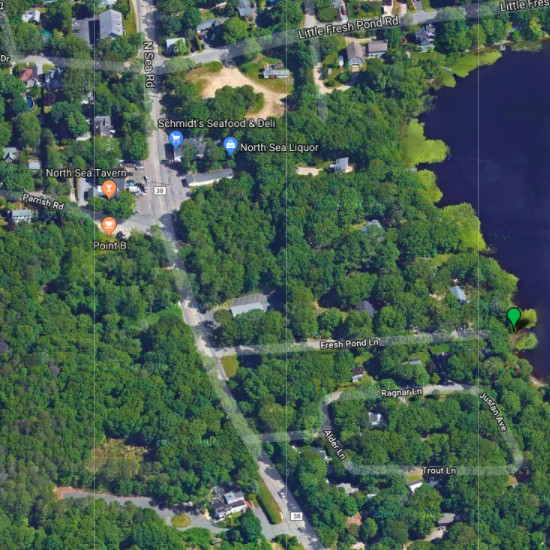
09 • 09 • 2020
Reduce Water Quality Impacts on Little Fresh Pond
The goal of this campaign is to reduce the water quality impacts on Little Fresh Pond.
Status: VICTORY!
Little Fresh Pond is a 19-acre pond within the Town of Southampton. The Eastern Long Island Chapter’s Blue Water Task Force began sampling Little Fresh Pond in October of 2016, with many of the samples being over the EPA Health Standard for recreational waters. Year after year, Little Fresh Pond yields some of the worst water quality of the sites sampled by the Eastern Long Island Chapter's Blue Water Task Force. View the latest results here.
In addition, Surfrider members are concerned about blue-green algae (cyanobacteria) blooms that have occurred in Little Fresh Pond. Blue-green algae blooms pose a serious health hazard and take away recreational opportunities for paddling, swimming, and fishing.
An expansion is being proposed to an existing summer camp that abuts Little Fresh Pond. This expansion would significantly increase the capacity of the camp as well as accommodate a number of counselors living on site. Because of this increase in capacity, many residents have grown concerned about the impacts to water quality within Little Fresh Pond. Because this camp and all residential areas aside it rely on on-site septic systems, the pond would be impacted by increased nutrient inputs, thereby exacerbating the possibility of harmful algal blooms as well as over-capacity septic systems that could leak even more bacteria into the water.
If the proposed camp is approved for construction by the Town of Southampton, we ask that the most up-to-date septic system be required for installation the property to prevent further water quality degradation from pathogens and nitrogen for the campers and the entire community that surrounds Little Fresh Pond.
To educate about the current state of water quality on the pond, the Chapter worked with the local Homeowners Association to educate about current water quality conditions, as well as the importance of septic maintenance and on-site landscape management that would reduce water quality impacts to the pond.
While the Blue Water Task Force data is great in telling us where problems exist, our methods aren't able to tell us where exactly the problem is coming from. To do so, one dedicated member of the HOA employed the work of the Environmental Canine Services, which employs canines (yes, dogs) to give a display (sit, bark) to show whether or not human waste is present in the pond. The results of this study confirmed that 8/11 samples that were collected around the perimeter of the pond had human waste present. In addition, Dr. Chris Gobler's lab at Stonybrook SOMAS offered to analyze one sampling event from Little Fresh Pond through microbial source tracking using qPCA. The results indicated that some human waste was as well as bird, dog, deer, etc, likely due to stormwater runoff because the samples were collected after a rain event.
Given the scale of the proposed camp, and the existing water quality threats at Little Fresh Pond, the Chapter urged the Southampton Planning Board to require an Innovative Alternative (IA) septic system to be installed. Aside from normal Blue Water Task Force sampling to communicate about the problem of water quality at Little Fresh Pond, the Chapter submitted public comments to local government officials, providing testimony at public hearings, as well as submitted water quality reports.
After launching this campaign, in November of 2016, Suffolk County mandated that all new construction must include an IA Septic System. However, since the permit for this camp's expansion was submitted previous to this County mandate, it was unclear for several years whether the camp was going to be required to install an IA system.
In September of 2020, the Chapter received information from the Southampton Town Planning Board plans to augment the existing septic systems on site with new, IA septic systems that will reduce the impacts of nitrogen pollution on the nearby pond.
